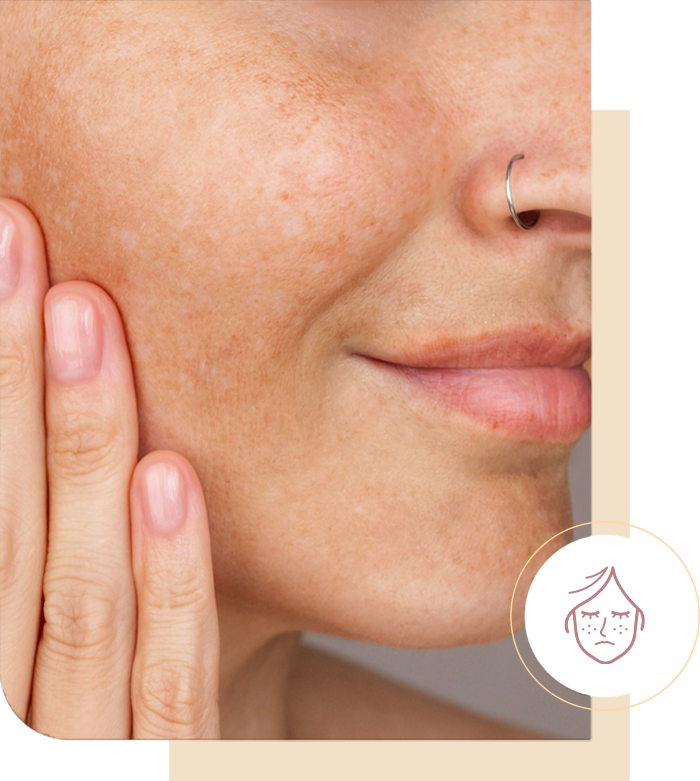Pigmentation Treatment in Bengaluru for Clear and Even Skin

Bid Farewell to Pigmentation: The Path to Even, Radiant Skin
Have you ever looked in the mirror and noticed stubborn dark spots that just won’t fade? Or perhaps your skin has developed an uneven tone, making it hard to achieve that smooth, radiant complexion you desire. Pigmentation issues—like melasma, sunspots, and post-inflammatory hyperpigmentation—are more common than you think. They occur due to various factors, including sun exposure, hormonal changes, and skin trauma. But here’s the good news: with the right treatments, you can restore balance to your skin and achieve a brighter, more even complexion.
At Pigment Clinics, we offer expert solutions like laser treatment for pigmentation and chemical peel for hyperpigmentation to restore your skin’s natural radiance. These treatments work by breaking down excess melanin, exfoliating the skin, and promoting new cell turnover for a refreshed, glowing look.
So, whether you’re dealing with stubborn dark spots, hormonal pigmentation, or sun-induced discoloration, we have the right approach to help you regain your confidence with the best pigmentation treatment in Bangalore.
Types of Pigmentation We Treat
Not all pigmentation issues are the same. Understanding the type of pigmentation you have is crucial in determining the most effective treatment. Here are the most common pigmentation concerns we address:

Melasma
Melasma is a type of hormonal pigmentation that appears as brown or gray patches, usually on the cheeks, forehead, and upper lip. It’s often triggered by pregnancy, birth control pills, or hormonal imbalances like PCOS. While melasma can be stubborn, laser toning and chemical peels can significantly lighten the pigmentation and even out your skin tone.

Sunspots & Freckles
Long-term sun exposure can cause brown spots and freckles to appear on your face, hands, and shoulders. These spots result from an overproduction of melanin in response to UV rays. Laser treatment for dark spots is particularly effective in breaking down these pigmented areas and revealing a more uniform skin tone.

Post-Inflammatory Hyperpigmentation (PIH)
PIH occurs after skin trauma, such as acne, burns, or injuries. It leaves behind dark patches that linger long after the wound has healed. Chemical peels are a great way to speed up the skin’s natural exfoliation process and fade these marks more quickly.
What Causes Pigmentation?
Prolonged exposure to the sun’s harmful rays triggers melanin production, leading to sunspots, freckles, and overall skin darkening.
Conditions like pregnancy, PCOS, and certain medications can cause an imbalance in hormones, leading to melasma and other pigmentation issues.
Any form of skin injury—such as acne breakouts, burns, or cuts—can leave behind darkened scars due to an inflammatory response that triggers excess melanin production.
Post-Treatment Care: Keeping Your Skin Healthy & Bright
To ensure long-lasting results and prevent pigmentation from returning, proper aftercare is essential.
Here’s how you can take care of your skin post-treatment:
- Apply SPF Daily: Sun protection is non-negotiable. Always wear a broad-spectrum sunscreen with at least SPF 50 to shield your skin from harmful UV rays.
Stay Hydrated: Drinking plenty of water helps flush out toxins and keeps your skin looking fresh and radiant.
Use Skin-Brightening Serums: Serums containing ingredients like Vitamin C, niacinamide, and kojic acid help maintain an even skin tone and prevent further pigmentation.
Follow a Gentle Skincare Routine: Avoid harsh scrubs or exfoliants for at least a week post-treatment to allow your skin to heal properly.
Advanced Pigmentation Treatment Using Cutting-Edge Technology
Laser Toning
One of the most advanced treatments for pigmentation, laser toning works by gently breaking down melanin clusters within the skin. The laser energy penetrates deep into the skin’s layers, targeting pigmented cells without causing damage to the surrounding tissue. Over time, these pigmented areas fade, revealing a smoother and more even complexion. Laser toning is an excellent option for those looking for a non-invasive and effective solution for pigmentation, especially for laser treatment for dark spots and melasma.
Chemical Peels
If you’re struggling with stubborn pigmentation, a chemical peel for hyperpigmentation can work wonders. This treatment involves applying a specially formulated solution to the skin that exfoliates the outermost pigmented layers, allowing fresh, new skin to emerge. Chemical peels stimulate collagen production, enhance skin cell turnover, and fade dark spots effectively. They are particularly beneficial for treating post-inflammatory hyperpigmentation and sun-induced pigmentation.
FAQs
Is laser treatment for pigmentation safe?
Yes, laser toning is a safe and effective treatment when performed by trained dermatologists. It is non-invasive and has minimal downtime, making it a great option for those looking to treat pigmentation with minimal discomfort.
How many sessions do I need for visible results?
The number of sessions varies depending on the severity of pigmentation. Most patients see significant improvement after 3 to 6 sessions, with optimal results achieved through a customized treatment plan.
Are chemical peels suitable for all skin types?
Yes, but the type of chemical peel used will depend on your skin type and pigmentation concerns. Our dermatologists will recommend the best peel for your skin to ensure safe and effective results.
Can pigmentation return after treatment?
While treatments significantly reduce pigmentation, maintaining results requires consistent skincare, sun protection, and, in some cases, follow-up treatments.


